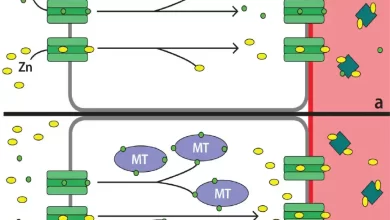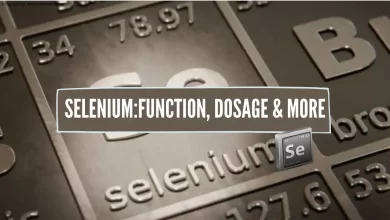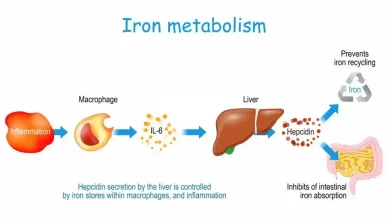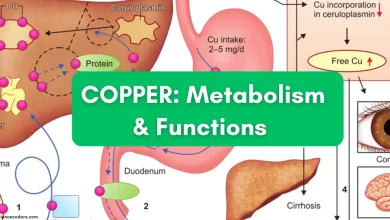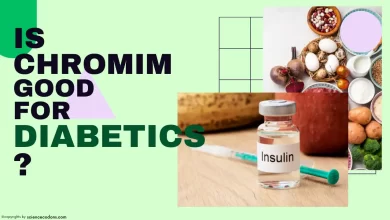Zinc is a vital and rare element essential for maintaining good health. In the following, we will explore the role of zinc in the human body.

Zinc (Zn), with an atomic number of 30 and atomic mass of 25, is the second most crucial trace element in the body after iron. It is present in adults at a concentration of approximately 2 grams. Most of the body’s zinc is concentrated in tissues and organs with high metabolic activity. About 55% of this mineral is found in muscle tissue, while nearly 30% is located in bones.
The prostate, semen, and retina contain high levels of zinc. The zinc concentration in red blood cells is about ten times higher than in plasma, and most of this zinc is located within the cytoplasm in the form of carbonic anhydrase.
Functions of zinc in our body
Zinc plays a crucial role in cell growth, strengthening cell membranes, boosting the immune system (mainly neutrophils), promoting tissue repair, aiding blood clotting, and supporting vision. The protein structure that binds to retinol contains zinc. Zinc also inhibits apoptosis.
Immune function
Zinc is crucial for immune function. It aids in activating immune cells and producing antibodies, which are proteins that combat infections. Zinc deficiency weakens the immune system and increases susceptibility to infections.
Metallo enzymes
Zinc is bivalent in biological systems and does not participate in oxidation-reduction reactions. Numerous metalloenzymes mediate zinc’s metabolic functions.
Zinc is a component of more than 300 metalloenzymes, including carbonic anhydrase, alcohol dehydrogenase, carboxypeptidase, alkaline phosphatase, glutamate dehydrogenase, lactate dehydrogenase, superoxide dismutase, thymidine kinase, RNA and DNA polymerases, and reverse transcriptase.
Growth and development
Zinc plays an important role in protein synthesis and gene expression. Zinc plays a role in protein structure stability, nucleic acid stability, cell division, spermatogenesis, oogenesis, pituitary and adrenal gland activity, night vision, taste sensation, maintenance of intracellular organelles, transport processes, and immune response.
Enhance wound healing
Numerous studies have shown the importance of zinc in biosynthesis and tissue preservation, particularly in collagen formation. Zinc is likely to play a role in wound healing, such as surgical wounds. Zinc is sometimes used to enhance wound healing.
What amount of zinc is recommended for wound healing?
Zinc is a crucial trace element in the human body and plays a vital role in the healing of wounds. According to a study(HMP), clinicians recommend administering up to 50 mg of elemental zinc daily until the wound is fully closed or until epithelialization is well-established. In individuals with zinc deficiency, supplementation with 25 mg to 50 mg of elemental zinc per day for three months has improved wound healing. Notably, the recommended daily amount of zinc is 8 milligrams (mg) for women and 11 mg for adult men. High levels of supplemental zinc, ranging from 100-300mg per day for extended periods, can lead to reduced copper and iron levels, disrupted collagen cross-linking, and hindered wound healing. It is recommended to monitor the wound’s response to zinc therapy closely. If no progress is observed after 8 or 12 weeks, or if the patient becomes intolerant to zinc supplementation, it is advisable to stop the supplementation.
Zink and insulin
Zinc is necessary to activate the insulin gene. Zinc is essential for insulin activity.
Taste and smell
Zinc is essential for adequately functioning the senses of taste and smell. It is a component of gustatory papillae, the taste buds on the tongue, and olfactory receptors, the smell receptors in the nose. Zinc deficiency can impair the senses of taste and smell.
| Zinc function | Description |
|---|---|
| Immune function | Zinc is essential for the proper functioning of the immune system. |
| Wound healing | Zinc is involved in all stages of wound healing. |
| Growth and development | Zinc is essential for growth and development during childhood and adolescence. |
| Taste and smell | Zinc is essential for the proper functioning of the senses of taste and smell. |
| Regulating blood sugar levels | Zinc helps to regulate blood sugar levels. |
| Protecting against oxidative damage | Zinc helps to protect cells from damage caused by free radicals. |
| Reducing the risk of heart disease | Zinc may help to reduce the risk of heart disease. |
| Improving cognitive function | Zinc may help to improve cognitive function. |
